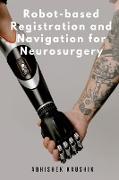- Start
- Robot-based Registration and Navigation for Neurosurgery
Robot-based Registration and Navigation for Neurosurgery
Angebote / Angebote:
Brain ailments may have to be often treated with surgery. Neurosurgery demands special
skills in terms of insight, accuracy, alertness, and navigation control. Though humans attain
these qualities, there exist complications associated with open brain surgery or craniotomy.
The option to isolate the problem region from the rest and execute minimum invasion will
lessen the complications. In Minimally Invasive Surgery (MIS), the surgical task can be
performed through a small burr hole drilled on the skull of the patient. Less risk, minimum
invasion, reduced healing time, and fewer chances of the infection are some of the benefits of
the MIS. In conjunction with these advantages, MIS has some downsides like narrowing of
the field of view of the surgeon and difficulty in tool handling through a burr hole. MIS often
coupled with stereotactic neurosurgery, where the 3D coordinate system is utilized to locate
the problem region and to navigate the surgical tool within the brain.
The accuracy of frame-based stereotactic neurosurgery is high compared to the frameless
method but lacks in patient comfort. Generally, the frameless system works in combination
with a stereo camera. The stereo camera, mounted at the Operation Theatre (OT),
continuously tracks the surgical tool by computing the location of reflective markers attached
to the tool. The reflective markers should always be visible to the stereo camera to avoid the
line of sight problem.
The frameless robot-based neurosurgery is a stereotactic MIS. It takes care of patient comfort
and enhances the possibilities of the MIS by providing detailed internal visualization through
multiple cross-sectional images, 3D patient-specific model, and real-time tracking of the
surgical tool. Further, it can achieve better accuracy, higher repeatability, tremor free
operation, and highly focused miniature surgery. The overall accuracy of robot-based
neurosurgery depends on many factors like robot accuracy, imaging accuracy, the
measurement accuracy of reference points in medical image space as well as robots' space.
Majorly the neuro-registration method and the practice play a vital role in achieving high
accuracy in neurosurgery.
Fremdlagertitel. Lieferzeit unbestimmt
